Can Japanese Car Brands Stage a Comeback Amidst the Surge in Electric Vehicles?
![]() 02/11 2025
02/11 2025
![]() 483
483
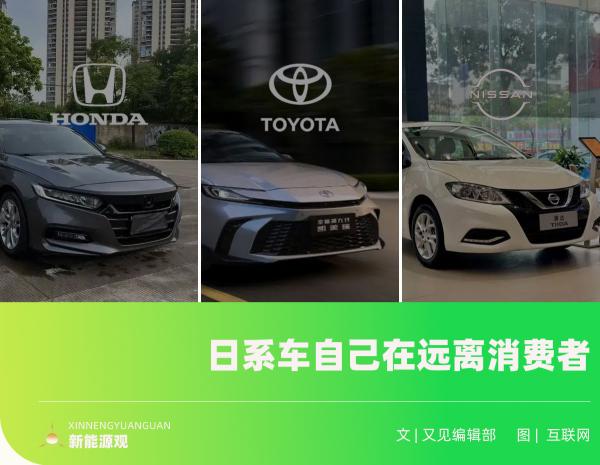
Original article by New Energy Outlook (ID: xinnengyuanqianzhan)
2884 words in full text, 8 minutes to read
Japanese car brands may have missed their last chance to reclaim their 'golden era'.
On February 6, multimedia platforms reported that Honda Motor and Nissan Motor have officially terminated their merger negotiations.
Two months prior, these two automakers were still aiming to finalize their merger ratio based on share prices, asset sizes, and external institutional analysis by June 2025.
This much-anticipated 'marriage' plan began with high hopes but ended in disappointment. Behind this outcome lies not only the contradictions between Nissan and Honda regarding integration ratio and management rights allocation but also the dire market situations faced by both companies. They are like struggling vessels in turbulent waters, barely able to stay afloat.
It's important to note that these two companies are not the only ones facing a market downturn. From the current market perspective, the entire Japanese car brand sector is in a precarious position. Data from the Passenger Car Association reveals that in 2024, Japanese brands' market share in China was 13.7%, a decrease of over ten percentage points from their peak market share in 2020.
Who has lured away the steadfast 'believers' of Japanese cars? What caused once-glorious Japanese cars to gradually fade in the market tide?
1. 'Japanese Car Fans' Shift Their Affections to Electric Vehicles
In the recently concluded year of 2024, another group of loyal Japanese car fans has turned to domestic brands.
Data from the Passenger Car Association shows that in 2024, the market share of domestic brands was 60.5%, an increase of nearly nine percentage points year-on-year. This growth rate fully compensated for the 3.3% market share lost by Japanese brands during the same period.
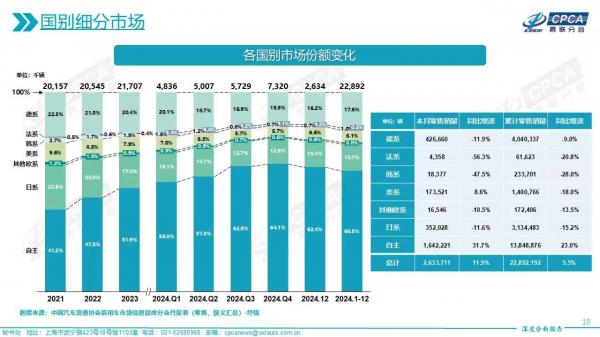
Image/Changes in Market Share by Country
Source/Screenshot from the internet and New Energy Outlook
Li Guodong (pseudonym), a member of the post-70s generation, has purchased four Japanese gasoline cars for his family, but last year, he reluctantly traded in his Nissan Teana for a domestic new energy vehicle.
In Li Guodong's view, previously buying Japanese cars was about convenience. They offered low fuel consumption, low maintenance and repair costs, and a well-established reputation. Compared to domestic gasoline cars, they were more reliable and durable. However, seeing more and more new energy vehicles on the road, he felt tempted. Coupled with the fact that the electricity cost of new energy vehicles is much lower than gasoline, he decided to give one a try.
'Nowadays, some domestic cars in the same price range are much better than Japanese cars. There's no need to buy Japanese cars just to save fuel because electric cars that don't need refueling are even more appealing,' said Fang Keke (pseudonym), an owner of an NIO ET5 from the post-80s generation.
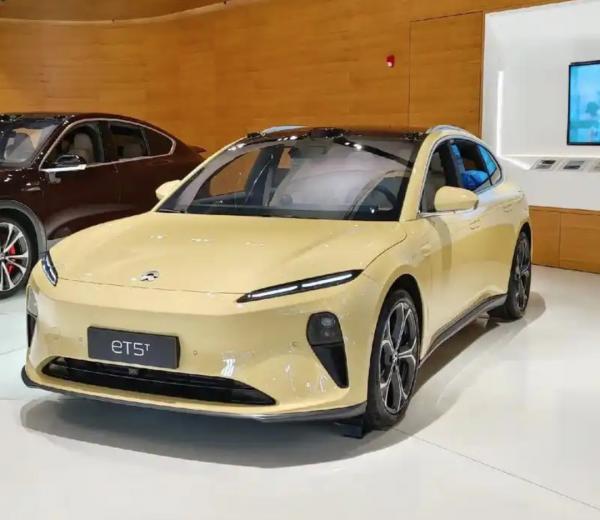
Image/NIO ET5
Source/Screenshot from the internet and New Energy Outlook
Xu Hao (pseudonym), also from the post-80s generation, has a different perspective from Fang Keke. He believes that vehicle cost is insignificant compared to the driving experience. The main reason he traded in his Prado for a Wenjie M9 was out of curiosity about intelligent driving.
'I don't think the acceptance of new things has anything to do with age. When a new thing emerges with certain value to the times, we are willing to try it,' he said.
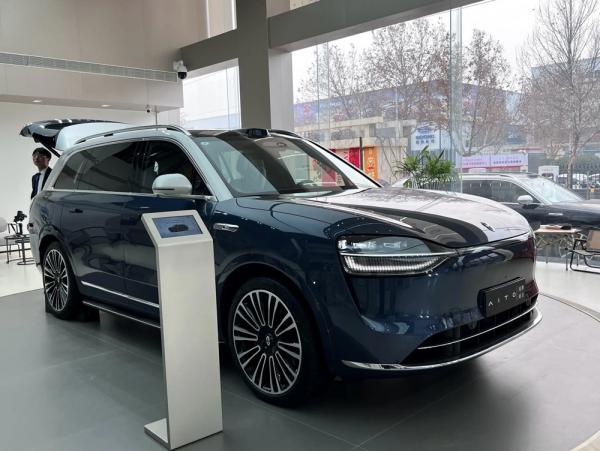
Image/Wenjie M9
Source/Screenshot from the internet and New Energy Outlook
Xu Hao revealed that Japanese brands lag far behind new forces such as Li Auto and Wenjie in terms of technical accumulation and application experience in intelligence, which is also one of the main reasons for his decision to abandon Japanese cars.
From interactions with many consumers, it's evident that the previous popularity of Japanese cars in China was based on the market conditions at that time. Nowadays, with the widespread adoption of new energy vehicles in China, consumers' perspectives have gradually broadened. As a result, Japanese cars' advantages in the era of internal combustion engines have gradually weakened.
It cannot be ignored that Japanese car brands have also been focusing on the new energy field in recent years, but judging from the current situation, they still fail to produce a new energy vehicle model that can carry the main burden.
In contrast, the first batch of new automakers, such as Li Auto, NIO, and Zero Run, and even Xiaomi, which just entered the market last year, have all achieved rapid conquests in the fields of electrification and intelligence. Many popular models have emerged under their banners.
Many consumers said that their impressions of Japanese cars mostly still linger in the era of gasoline cars, and they know very little about the electric vehicle products of Japanese brands.
Nowadays, the cost-performance advantage of Japanese cars compared to domestic brands no longer exists. Coupled with their lag in the field of intelligence, it will inevitably make more consumers choose to 'abandon' them.
2. The Once-Glorious 'Three Swordsmen' Have Become 'Trapped Beasts'
Looking back at history, from 2010 to 2020 can be described as the 'golden decade' for Japanese car brands in the Chinese market. Toyota, Honda, and Nissan, the 'three swordsmen', almost monopolized half of China's passenger car market with their characteristics of fuel efficiency, durability, and high resale value.
At that time, among consumers, slogans like 'Toyota cars never break down' and 'Buying a Honda is like getting a car with a free engine' were once prevalent.
However, the good times didn't last long. The rapid rise of new energy vehicles caused Japanese car brands' market position to plummet. In 2024, Japanese brands sold only 3.134 million vehicles in China, a year-on-year decline of 15.2%, nearly 1.9 million fewer than the peak sales in 2019.
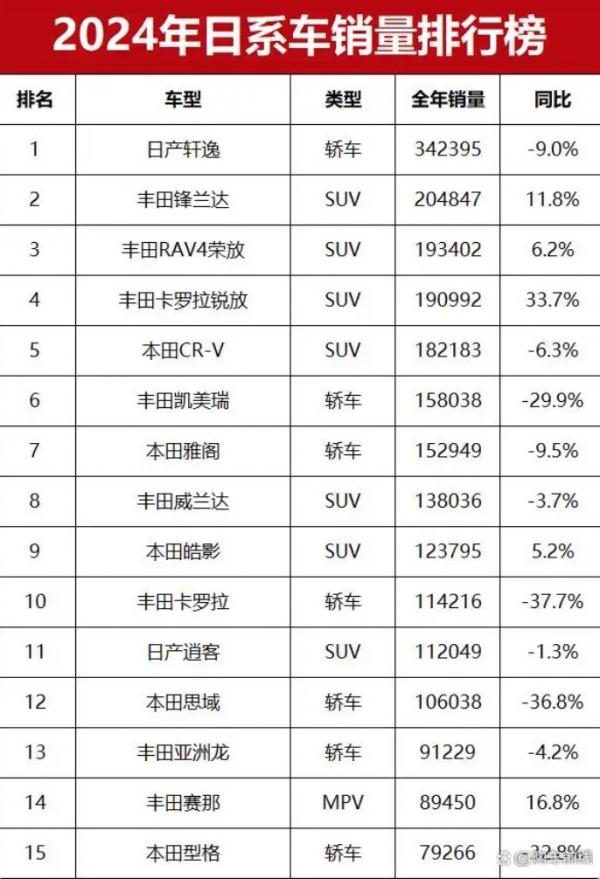
Image/2024 Japanese Car Sales Ranking
Source/Screenshot from the internet and New Energy Outlook
Specifically, in 2024, Toyota, Honda, and Nissan sold 1.776 million, 852,000, and 697,000 vehicles in China, respectively, with year-on-year declines of 6.9%, 30.9%, and 12.2%.
It needs to be clarified that the sales downturn of Japanese cars did not appear only in 2024. As early as a couple of years ago, Japanese cars were already in deep trouble. Based on this, Japanese cars resorted to price cuts in 2024, attempting to exchange volume for price, but judging from the above sales figures, its effect was negligible.
Constantly breaking the price bottom line will bring 'sequelae', which will naturally be reflected in the financial aspect of Japanese cars.
For example, from April to September of the 2024 fiscal year, Nissan's net profit was 19.2 billion yen, a year-on-year plunge of 94%; Honda's net profit was 494.6 billion yen, a year-on-year decrease of 19.7%.
The double setbacks in sales and revenue data have brought about a chain reaction of layoffs, production cuts, plant closures, etc.
In July 2024, after experiencing a large-scale layoff crisis, Guangqi Honda announced that it would close its fourth production line with an annual capacity of 50,000 vehicles in October.
In November of the same year, Nissan announced that it would lay off 9,000 employees globally, cut production capacity by 20%, and sell a 10% stake in Mitsubishi in exchange for 68.6 billion yen in cash.
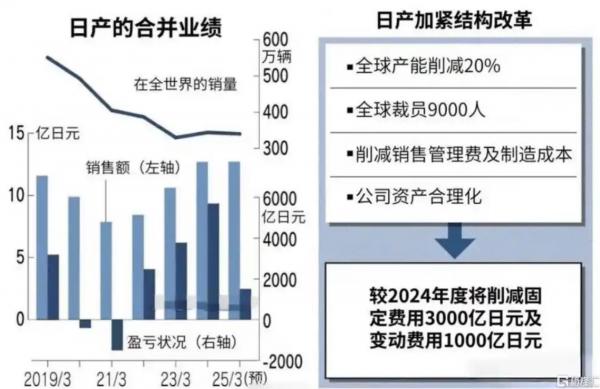
Image/Nissan Structural Reform
Source/Screenshot from the internet and New Energy Outlook
A Nissan executive previously revealed that Nissan may only have 12-14 months left.
Wang Xumin (pseudonym) recently prepared to trade in his old Camry, which has accompanied him for seven or eight years, for an electric car. According to him, when choosing a new energy vehicle, he also considered Japanese brands. After all, he has certain feelings for Japanese cars, but ultimately gave up due to their shortcomings of shorter range and slower charging compared to new automaker brands.
'The days when Japanese cars could be passed down for three generations are long gone. Now it seems more like an antique. Sentiment will definitely be weakened in the face of high technology,' said Li Guodong, a once-loyal fan of Japanese cars.
Many share the same views as the above two consumers. Most old Japanese car fans who have shifted their affections to Chinese electric cars said, 'Compared to new automakers, Japanese new energy vehicles are like feature phones versus smartphones.'
3. Is There a Possibility of 'Warming Up' in the Future?
Currently, Japanese brands have undoubtedly entered a critical period of survival.
Taking the merger event between Honda and Nissan as an example, at the end of December last year, the two automakers in bankruptcy crisis attempted to save themselves through a merger, but this negotiation collapsed after just over a month.
It is understood that during the negotiation process, Honda hoped to turn Nissan into a subsidiary of Honda, while Nissan hoped for an equal merger. Therefore, the contradiction over the integration ratio and management rights allocation ultimately became the fuse that collapsed this merger case.

Image/Merger Negotiations Between Nissan and Honda
Source/Screenshot from the internet and New Energy Outlook
Obviously, the termination of this 'huddling together for warmth' plan has made consumers even more worried about the future of Japanese cars. After all, in the brutal reality of market competition, it is self-evident whether distant water can quench a near thirst.
Japanese cars that have not kept up with the pace of the new energy market can only wait for their end in the process of falling behind and declining?
After an overview of the overall automotive market, it is not difficult to find that the current elimination round in the new energy vehicle market has only completed the first round of competition. Before the decisive round truly arrives, Japanese brands may still have a chance to accumulate energy and reborn.
Many former loyal fans of Japanese cars frankly expressed their views, 'The quality of Japanese cars is indeed excellent, but now everyone considers many aspects when buying a car. Besides durability, they will also consider the vehicle's performance in intelligence. The main reason I lost interest in Japanese cars is their lag in intelligence. Of course, if Japanese cars can have the same intelligent driving system as domestic cars in the future, I am still willing to choose them again.'
'The brand history of Japanese cars is there. It definitely has deeper technical accumulation than some new automakers that have just entered the market. If it can change its current conservative and mediocre appearance design in the future, I believe many people would be willing to buy it. After all, who doesn't want to drive a cool car out?'
Although there is still room for turnaround, time waits for no one. Against the backdrop of China's new energy vehicle penetration rate exceeding 50% for five consecutive months in 2024, if Japanese brands want to reverse the current downturn, they may still have to learn to go with the flow and reshape their image as soon as possible.
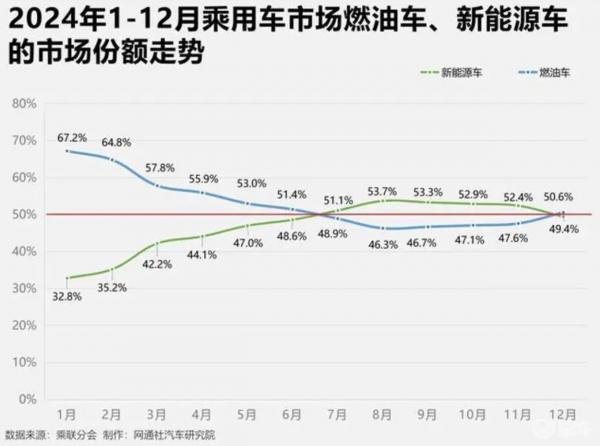
Image/Trend of New Energy Vehicle Market Share in 2024
Source/Screenshot from the internet and New Energy Outlook
In terms of products, Japanese brands should integrate resources, optimize operations, and increase investment in research and development of electric vehicle technology as soon as possible. At the same time, they should develop differentiated models for different market segments to meet the needs of different consumers.
The improvement in intelligence is even more important. Japanese brands should adopt a 'two-pronged' strategy. While focusing on independent research and development in intelligence, they should also choose to cooperate with leading manufacturers in the intelligence field to introduce advanced software and technology to more efficiently make up for shortcomings.
Of course, Japanese cars with a glorious past must know how to save themselves. It just depends on whether they can make decisive changes. As long as they can produce electric cars favored by consumers, the outcome is still unknown. However, it is certain that the ticket to dawn will not be left to any nostalgic person.








